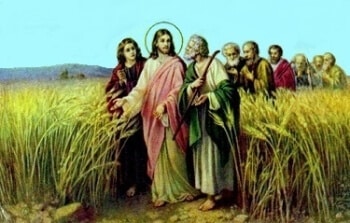 The parables Jesus taught are timeless. When he taught the parables, it puzzled everyone who heard them, including his disciples who approached him after the crowds left in today’s gospel. They asked Jesus to explain the parable about the weeds and the wheat to them, because they didn’t understand what he was talking about either. Notice Jesus’s patience in explaining this parable to them. He is clearly a master teacher and his disciples looked up to him, trying their best to understand his teachings, because they knew he taught the truth.
The parables Jesus taught are timeless. When he taught the parables, it puzzled everyone who heard them, including his disciples who approached him after the crowds left in today’s gospel. They asked Jesus to explain the parable about the weeds and the wheat to them, because they didn’t understand what he was talking about either. Notice Jesus’s patience in explaining this parable to them. He is clearly a master teacher and his disciples looked up to him, trying their best to understand his teachings, because they knew he taught the truth.
Jesus used such simple, everyday images to teach complicated subjects. Modern people who have a high intellect, or an advanced education could learn a few things from Jesus’s simple methods of teaching.
The images that Jesus used in the parables, and the story that forms in the mind when we hear them, are timeless. People of all ages, man or woman, from different cultures and walks of life, can relate to them. Over 2,000 later we can still relate to them. Isn’t it amazing that the parables apply so perfectly to everyone and yet we never outgrow them?
The images in dreams are like a universal language too. If you remember, Joseph in the old testament had a gift for interpreting the images in dreams, especially the Pharaoh’s dream about the fat and skinny cows.
Visual images are an important way of understanding and transmitting the faith to this day. The stained glass windows in our churches portray Jesus, Mary and Joseph’s life and the lives of the saints, because many years ago people couldn’t read the bible for themselves. Even today, if you visit a Catholic church in another country and can not speak the language, the images, statues and visual elements of our Catholic faith are still easily understood by everyone, especially at mass. The images are a universal language.
The parable about the weeds in the wheat is pretty self-explanatory though. The only additional insight into this parable might be to realize that only Jesus knows the weeds from the wheat, because sometimes what looks like a weed, is actually a plant that is not fully developed yet. Some people are late bloomers. Anyone who gardens has seen plants that are not quite as developed as the others, but with the right growing conditions, that plant may one day bloom or produce fruit too.
Sometimes the wrong soil, light, or water inhibits the growth of plants. Little plants will sometimes spring up underneath a bigger plant, that blocks out most of the sunshine that they need in order to grow and mature properly. Sometimes big plants will drain the nutrients out of the soil that surrounds them, and this too, can affect the growth of the little plants.
Jesus talks about the remedy that will take place at the end of the age. The angels will separate the weeds from the wheat then. A person can’t help but think of the Eucharist in this parable though. We consume the Lord’s body at every mass and we are scattered throughout the world. When he gathers the wheat into his barn, maybe that is what he means. He will gather his own to himself.
It makes us really sad to think that not everyone will be gathered into the safety of his kingdom though. We should never tire of planting the seeds of faith in our family, with our friends, classmates, coworkers, neighbors, the community we live in and even the random strangers we encounter in our lives. We work for a lot of things in life that are temporary and do not last, but a person’s soul is eternal. Eternity is the horizon we should keep our focus on, while keeping an eye on our steps as we travel through this life.
The last sentence in the first reading for Mass today might actually be a good way to end this reflection on the scriptures:
“… you gave your children good ground for hope that you would permit repentance for their sins.”
We plant the seeds, but God gives the growth. But, a lot of our growth stems from the mistakes we make in life, especially if we are sorry for our mistakes and learn something from them. It is the same for all those we love as well. They go through some of the same processes we do. Jesus is the hope for all of us though, to make it safely to our Father’s kingdom.
Daily Mass Readings:
Wisdom 12: 13, 16-19 / Psalm 86 / Romans 8: 26-27 / Matthew 13: 24-43
